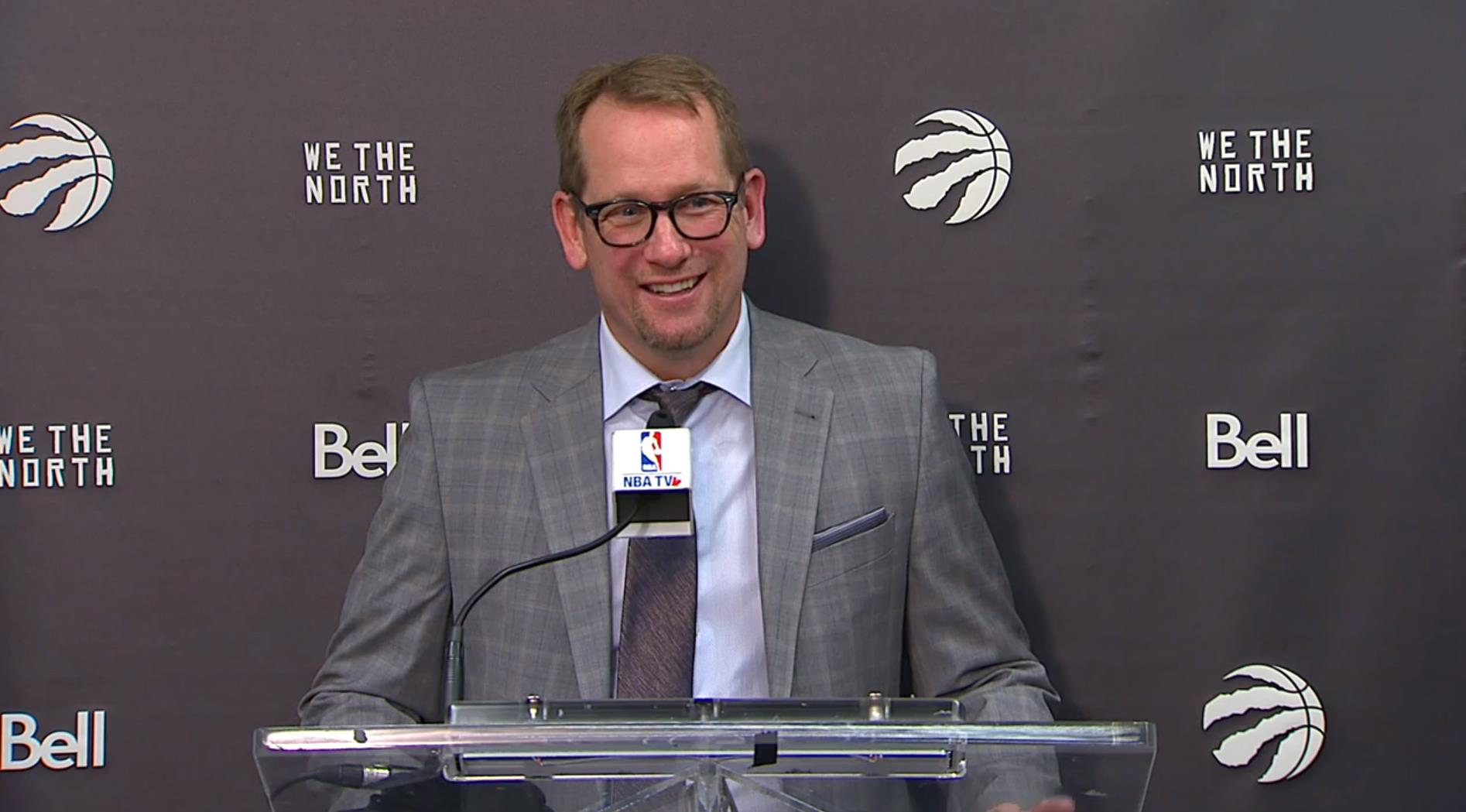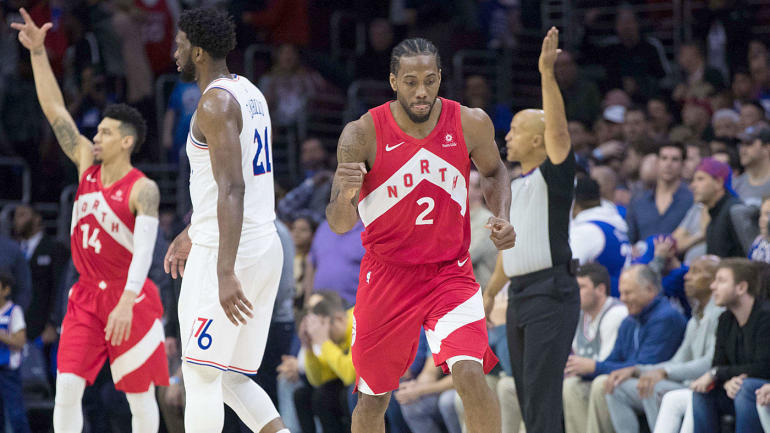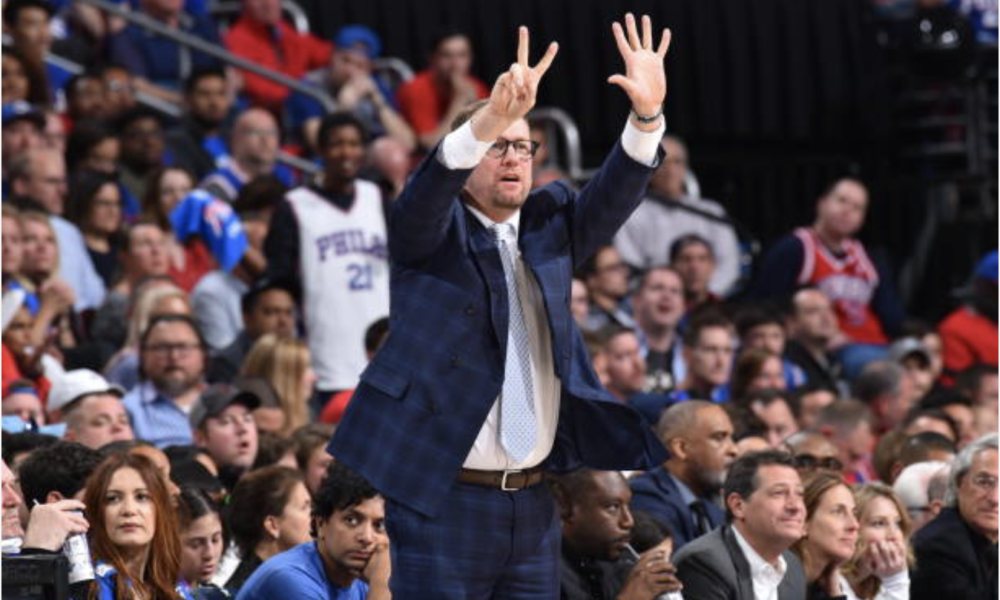It is a minor miracle that the Toronto Raptors were able to win game four over the Philadelphia 76ers despite shooting a putrid 10-of-31 from deep. It is yet more miraculous that the Toronto Raptors won with an injured Pascal Siakam offering only nine points, only the fourth time he has scored so few in 2018-19, regular season or playoffs. (The Raps were 1-2 when Siakam scored in single digits before Sunday afternoon.) A number of elements broke poorly for the Raptors in game four, yet they won 101-96 anyhow. Such a game was Nick Nurse’s Waterloo, and the most important win of his young head coaching career.
Before game five, the Raptors were 16-16 when shooting 32.3 percent from deep or worse across the regular season and playoffs. It was a coin clip, a fifty-fifty chance, even across the board. And the game played out like that, with 10 lead changes and 11 separate moments that the teams were tied. Like game two, the contest was anyone’s for the full 48 minutes.
Except Kawhi Leonard tilted the balance of the toss, like Aaron Eckhart with a jumpshot. He changed the parameter of the question. He was too brilliant, too otherworldly. He didn’t redeem Toronto’s basketball soul, because it never needed redeeming, but Leonard is doing something we’ve never seen another Raptor accomplish on this playoff run. The difference in game four, however, was not Leonard. He scored 39 in game four. He performed about as well in games two and three, averaging 34 points. It didn’t matter, as the Raptors lost both anyway. If Leonard was a constant, what changed a close loss in game two into a close win in game four?
The difference was Nick Nurse. With Leonard already offering 39 points, the Raptors needed a whole lot more from the rest of the squad. At least this time, they managed to get enough. The most visible change was in Nurse’s rotations. After playing the entirety of the playoffs with the same rotation, it changed dramatically in game four. Gone were all the Siakam+bench minutes (which changed to Leonard+bench in game three). Instead, Nurse had zero minutes with only one starter on the floor. He had only 5.7 minutes with two starters on the floor (the Raptors treaded water in those minutes, going -1), and for the rest of the game Toronto had three starters or more. Nurse matched the Sixers’ rotation advantages, sure, but he also surpassed Brett Brown in creativity in game four.
Nurse instituted the double-center lineup, with Ibaka and Gasol playing together for almost half the game, 23.5 minutes. The Raptors won their minutes by seven points, and it was by far the most they’d ever played together. In fact, those two had only played 31 minutes together in the entire regular season. Nurse used them together out of necessity, with Siakam limited, but also as a weapon to counter Philadelphia’s gigantic lineups. Ibaka and Gasol were terrific on defense, combining to contest 29 shots. They combined for 10 box outs. Among 19 high-minute two-man units for Toronto in game four, Ibaka and Gasol had the third-lowest defensive rating, at 90.9. The introduction of the double-giant lineup was a massive bonus. At the same time, Gasol’s minutes were far closer to matching Joel Embiid’s, and Gasol again was terrific defending Philly’s monster center, holding him to 11 points.
Every starter other than Siakam – limited by his right thigh contusion – played for at least one full quarter. Such long stretches allowed Nurse to eliminate his units with four bench players.
VanVleet played only seven minutes, down from the 21 he’d been averaging in the series. He’s been playing poorly, with Toronto losing his minutes by 25 points over the first three games, so Nurse limited his exposure in the series. Instead, Danny Green and Kyle Lowry each played over 40 minutes, and Patrick McCaw got a few minutes of run to see if he could introduce some defensive chaos. With VanVleet, McCaw, and Norman Powell playing fewer than 10 minutes each, the Raptors effectively rode a six-man rotation. The Sixers ride their starters, and they have dominated minutes when they’ve had starters against Toronto’s transitional lineups, so Toronto limited its exposure by hewing those minutes down to nil.
Nurse even reached deep into his bag for lineups, playing the biggest lineup he could muster in the fourth quarter, with Lowry, Leonard, Siakam, Ibaka, and Gasol taking the court together. They were outscored, but the thought was there. Nurse went back to his experimental roots.
Another change came in Toronto’s willingness to shoot 3s with no hesitation. Who knows what got into Marc Gasol and Lowry in past games, but they were passing up wide-open triples with diligence. They combined to attempt only five triples in game three, missing all of them. Such unwillingness to shoot open shots dramatically impacts an offense. Jimmy Butler effectively treated Lowry like Siakam did Jonathan Isaac in the first round, cheating so far off of him that he could provide an extra body of defense against any drives. He trusted that Lowry wouldn’t shoot, and he was right; instead, Lowry would pump-fake and careen into a busy lane, finding no advantage of any kind.
That changed in game four. Lowry and Gasol combined for 13 triple attempts. The Raptors shot 31 triples, including 21 in the first half. The huge number in the first half forced Philly to play Toronto honest for the rest of the game, and offense came easier to the Raps as a result. It’s important to shoot good shots when they’re available. Passing up a wide-open triple is worse than missing it, as it frequently means someone will have to drive into a set defense on a short shot-clock, lifting the chances of a turnover. The defense will stop respecting you if you don’t shoot, cramping spacing for future possessions. The team clearly acknowledged the issue, and Gasol attempted seven 3s, and he only hesitated on a couple. The Raps knew that Gasol would need to shoot more with his defender sinking so deep in the lane. His 13 shots in game four were the most he’s attempted this playoff run, and the tied-most he’s attempted in a Raptors’ uniform.
As a result of Nurse overhauling elements of the Raptors’ approach to the Sixers series, but mostly as a result of Leonard being inhuman, the series is tied 2-2. After the Raptors were humiliated in game three, pundits were quick to write off Toronto. It would have been a familiar sight if the Raptors crumbled in the face of pressure, unable to recover. That didn’t happen. Toronto adapted and evened the series. Splitting in Philadelphia means the Raptors once again possess home court advantage.
It is the Sixers’ turn to be frustrated after game four. They held every Toronto player not named Kawhi Leonard to 5-of-24 from deep. They made more triples than the Raptors. And yet they got nothing from Embiid or Ben Simmons. Much like Toronto after game two, Philly has to be kicking themselves for letting this one slip away. It took a minor miracle for Toronto to win, but Leonard’s game has been consistently miraculous. To aid Leonard, Nick Nurse finally rose to the challenge, and Toronto is back in the driver’s seat. Now it’s Philadelphia’s turn to grasp for minor miracles.



